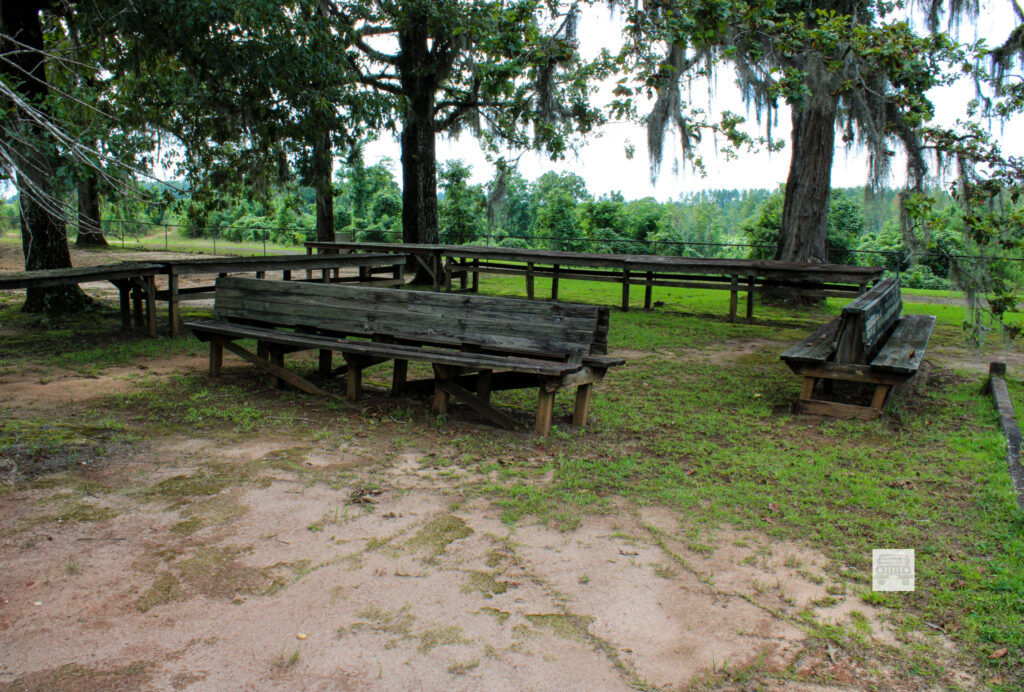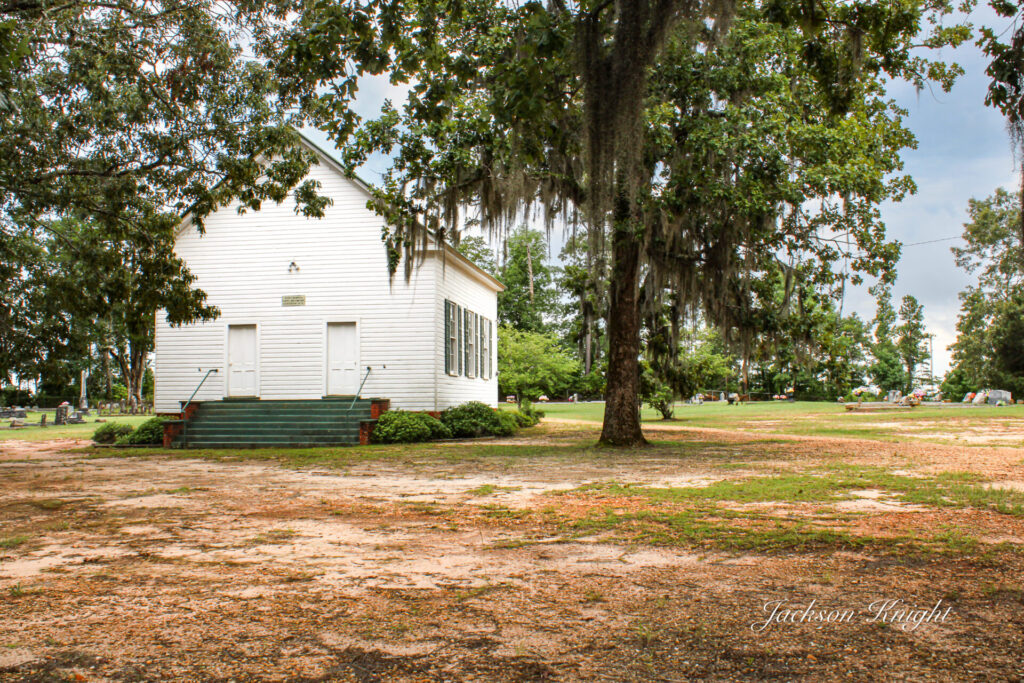There are many old churches in South Alabama that I visit and have written about or I am researching to write about. Of all that there are out there though Reaves Chapel in Southern Wilcox County holds more prominence for me than any other I can name. It does so for several reasons. First off, my Father, Grandparents, Great Grandparents, and Great Great Grandparents, are all buried there. Not only them but numerous other people who have influenced or been a part of my life in some way.
From my earliest childhood I remember visiting the cemetery there and going through it with my Great Aunt who is also buried there. One of my greatest regrets I have in life right now is that I cannot remember the stories that she told me about the people that she knew that are buried there. Unfortunately, I was too young and there were too many to get.

As always, I am searching for information and history on things of old. Recently I was able to get my hands on some information on Reaves Chapel Church and Cemetery. There is a pamphlet compiled by a lady by the name of Florence Lambrecht Swanson that I was able to read some information from that she had compiled. I was immediately enthralled by this particular piece of information because as I was reading through it I saw two names that immediately jumped out at me. The name of Minnie Knight Jordan, and Will Knight. Minnie Jordan being my Great Aunt that I had stayed with as a preschooler, whom I had walked the cemetery with many times hearing the stories of the folks that were buried there. Will Knight was of course my grandfather. I had also heard many stories from him along the way over my lifetime.
One story that jumped out at me from this little publication was the story of the Mystery Grave. I had heard the story numerous times as a child. My great aunt and my grandfather had both walked me to the exact spots in the cemetery where the shoes had hung on the fence and the grave was. When I saw the story in her booklet I was totally enthralled because she was quoting my grandfather and credited him for telling the story. Below I will share the story word from word from her booklet and the illustration used in her booklet:

Reaves Chapel Mystery, or Ghost Grave
Grave 1, Section A (not marked)
Each cemetery has its mystery or ghost grave, and Reaves Chapel is no exception. The following story was told by W.J. “Bill” Knight who was a student of Reaves Chapel School when the event took place in about 1917-1918. According to Bill:
“We left school at the end of classes one afternoon, and all was quiet and peaceful on Reaves Chapel Hill. It was a dreary Fall afternoon, with a slow misty rain falling and a heavy fog hanging low over the hill and surrounding hollows.
The next morning, in the playing about the school yard and cemetery area as usual before the bell, we discovered a new grave. In the far-left corner of the cemetery where none had been the afternoon before. The red clay soil was carefully mounded over the grave and hanging on the fence at the head of the grave was a pair of mud-spattered, cracked brogan shoes with run down heels tied together by the laces. We ran to the teacher in great excitement, all talking at once about what we had found. Not much schoolwork was done that day.
This discovery caused great concern and much speculation in the community, and several opinions were expressed concerning the grave. One was that the grave could contain the body of a member of an outlaw gang which was reported to have passed through the community sometime that same period. Another was that a convict had been killed, whether by fair or foul means it was not said, as the sawmill camp located nearby which used white convict labor and buried there during the night.
To this date, no one knows “Who’s There.”
More history in her booklet is as follows as closely word for word as I can decipher and type it. Again I give all credit to Florence Lambrecht Swanson who researched and wrote the publication.
The History of Reaves Chapel Church and Cemetery

Reaves(Reeves) Chapel Church and Cemetery are located approximately 15 miles southeast of Camden, Alabama on Reaves Chapel Road, new Wilcox County Road No. 16 on 2.41 acres of land in the NE ¼ of NE ¼ of Section 2 Township 10, Range 7E. This land was included in the U.S. Patent Certificate No. 40,863 received by James L. Reeves (Reaves) on December 1, 1852.
The first documentary evidence of Reaves Chapel Church and Cemetery is the land deed executed Feb 19, 1901 by Jesse Thomas and Elizabeth F. Reaves transferring the property “known as Reaves Chapel Church and Graveyard” to the Methodist Episcopal Church, South, through trustees R. A. Smith, J.W. Boroughs, A. Holloman, and E.S. Farish Jr. Jesse Thomas and John W. Reaves were sons of James L. Reaves.
James L. Reaves, a pioneer settler of the community was born in Kentucky in 1800 and came to the area while it was still part of the Mississippi Territory. He married Sarah S. Vinson, daughter of John W Vinson (Vincent) in Monroe County December 25, 1833. His first homestead was on 40.27 ½ acres of land in Wilcox County in the NE ¼ of the SE ¼ of Section 1, Township 10, Range 7, which he received August 1, 1837 under U.S. Land Patent No. 25,703. He sold this area to Joshua Peavy, Methodist Minister, on October 20, 1841 for $350.00 (Wilcox County Land Records, Book G, page 195), and built his home in Section 35 where part of the log and frame house still stands. The “Location Map,” page 1, shows the location of this home site, of Reaves Chapel Church and Cemetery, and the “Original Reeves-Farish-Mallard) Cemetery.”
The exact date that the Reaves Chapel Church was established is in question. The property was deeded to the Methodist Episcopal Church, South, in 1901. The phrase in the deed, “known as Reaves Chapel Church and Graveyard,” seems to indicate that it was already in use as a house of worship before 1901. Also, the certification affixed to the deed, “this is to certify that we release all claims we hold against the lands ‘known as the Reaves Chapel Church and Graveyard land’ this February 19, 1901,” and signed by T.B. Farish & Company, has the same meaning.
It is thought that the 1901, date of the first deed, is the date Reaves Chapel affiliated with the Methodist Episcopal Church, South. Reaves Chapel either operated as an independent church before 1901. Or under one of the several different Methodist Conferences in Alabama during the 1800’s. Dr. M.E. Lazenby, in his “History of Methodism in Alabama and West Florida, page 163 gives an interesting account of Methodist Protestant Church, which eventually joined with the Methodist Episcopal Church, South, to form the Methodist Church.
It is believed and supported by facts listed below that the Reaves (Reeves) Chapel church was founded around 1859-1869 and is in use as a house of worship by the mid 1870’s. Information given by a former member, 1870’s as the date of the first burial in an unmarked grave, 1872, 1874, and the baptismal date of a former member all support the fact that it was in use before 1901.
Mrs. Samuel Ross (Harriett Issie Reaves) Thompson, Jr age 93 years at the time she gave the information in 1977, a former member whose family were members or Reaves Chapel since its beginning, related that her father Willian McDaniel Reaves, was born November 15, 1844.
She said, “Papa often told me that when he was about 15 years old, in about 1859-1860, he accompanied his father, James L. Reeves, and several neighbors about the community to collect funds to build the church which had been planned. Some interested parties gave money, others pledged materials for the building, and others offered their help in the construction. Building of the church was a slow process as the men only worked on the building when they were not busy with their crops, and more than one trip around the neighborhood for funds was necessary before it was completed and ready for use.
“He said,” she continued , “that the original church was constructed of logs, cut by the men, and finished with wide plank flooring, ceiling and walls. It as used as a church and school until it was destroyed by fire sometime during the period 1890-1895. It was replaced by the present white frame church which was built in about 1896-1900.”

The present church was built with two front entrances with steps leading to each. As was customary in many of he early churches, the men and boys entered the church through the right doorway and sat on the right side, and the ladies, girls, and very small children entered through the left doorway and sat in benches on the left side of the church, “ she added.
This beautiful old church still sits in the same location that it has for so many years. Meeting once a year family of those buried here and those wanting to learn of this rich history join to have a meal and meet concerning the business needed to keep the memorial going. Hopefully this beautiful place can continue to be maintained far into the decades and possibly even centuries to come.
If you have ties or other additions to this article please comment in the comments section.
Thanks, Jackson
